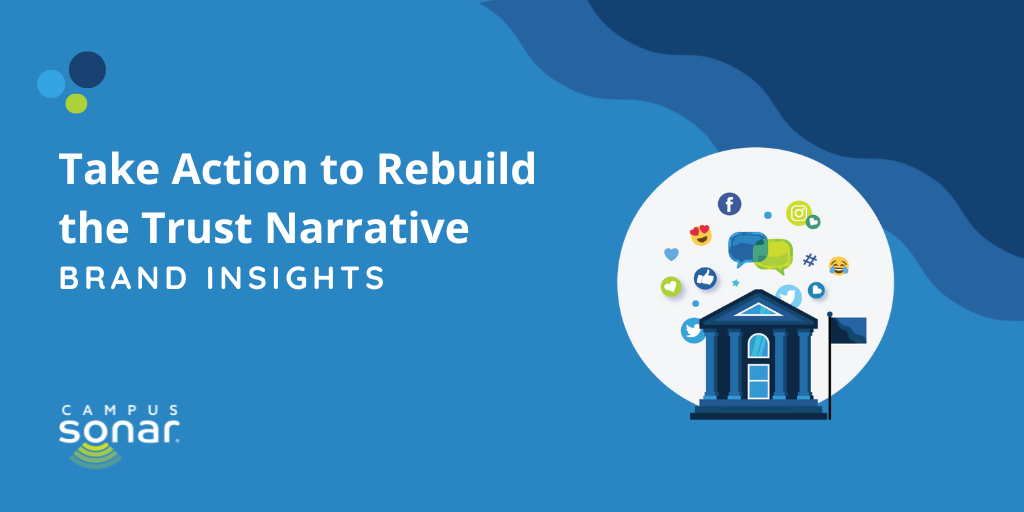Take action to rebuild the trust narrative

This spring, we hosted virtual roundtables that brought more than 300 higher ed professionals together to discuss the value of a college degree, innovative strategic planning, and growing graduate enrollment.
No matter the topic, the common thread was rebuilding trust in higher education. Here's what we heard.
Lead with Transparency
Building transparency and trust with your audiences is done by actively addressing your campus pain points, perceived weaknesses, and barriers. The strategic plan is your guidepost for solving these issues and enacting transformational change. In our discussion on strategic planning, Mike Moss, President of the Society for College and University Planning, shared that your strategic plan is a plan for change that’s data-informed. Dominique Raymond, Strategy Director at Lumina Foundation, added that the focus of the plan is people, “What your data tells you is where all strategic plans should start. And when it comes to institutions the [student] is the focus of institutions.”
Yet many presidents oversee planning and transformation initiatives without a data-driven approach. Uncovering institutional sentiment and perception from social media and online conversation during the environmental scanning and evaluation process is critical to leading with transparency and building trust. According to Deloitte’s Four Factors of Trust, consumers who believe a brand is high in transparency are two times more likely to promote the brand on social media.
Using an integrated approach that’s grounded in data supports your efforts to overcome challenges, establish transparency, and create a successful, sustainable plan. Social intelligence research provides the insights you need to ensure your messaging is authentic and transparent to your audience. “There are moments in planning that are data required and the rest is data informed around the student human experience,” Mike Moss explained. “Sometimes that may not be as richly, quantitatively outlined, but it's super important.”
Listen to and Serve Your Audiences
The conversations on differentiation and the brand value of college emphasized the importance of listening to your audiences to rebuild trust. The willingness to listen to your students and their families helps you demystify college, genuinely understand their perspectives, and better align your messaging and resources with their questions, concerns, and needs.
Listening also helps you understand what resonates and what doesn't with your community. “They'll tell us. We don't own our brand, they do,” said Nicole Szymczak, Senior Director of Marketing and Communications at Michigan State University.
It’s equally important to remember that your brand is only as valuable as it is to your audiences and what they say about your brand. This emphasizes the importance of ongoing listening and maintaining a genuine understanding of where your audiences are and what their needs are at any given point in time. Recognizing the humanity and the uniqueness of each person builds trust with your audience.
Graduate enrollment growth experts agree that really thinking about your audience—using surveys, focus groups, or social intelligence to listen to them and meet their needs—is how to align program and enrollment growth.
Frame Messaging with Outcomes
Our social intelligence research revealed the importance of knowing and understanding outcomes. Individuals made direct connections between the value of a college degree and what they gain from it. The conversation included indisputable advantages and more than 30% of individuals mentioned unmatched opportunities and the ability for college to “open doors.”
Students want to see the social mobility, increased job prospects, greater employer benefits that come with a college degree. The research provides a clear path forward to align your operations and messaging to support individual, community, and societal outcomes.
Supporting societal outcomes includes working with the business community. Doug Palmer, President of Siena Heights University and Edward Conroy, Senior Advisor, Education Policy Program at New America, discuss how to leverage the talent resource and collaborate with employers.
Framing messaging with outcomes also might include:
- Auditing your communication flow to make sure you’re transparent and presenting enough value, as Shane Baglini’s team did at Muhlenberg College.
- Using data points specifically about alumni outcomes, graduation data, job placement data to showcase what makes your campus different from the next.
- Incorporating alumni stories to bring your campus outcomes to life.
Prioritize Preparation
More than 44% of the conversation in our report on rebuilding public trust included caveats that related to lack of preparation or motivation. Cautionary advice encourages prospective students to take advantage of opportunities, consider their major’s ROI, and prioritize career experience.
Prioritize student support services and the communication about them to demonstrate how education connects to career preparation. Storytelling is one way to do this and how Jay Jacobs, Vice Provost for Enrollment Management, and his team at the University of Vermont share opportunities that set prospective students up for success. “We give the student all of the opportunities to take advantage of when they’re here—sitting down with an advisor, studying abroad, internship opportunities—any tangible benefits.”
They also simplify students’ access points and ensure support is integrated to help them find the connections and people they need. Combating the common caveat that students are on their own once they start their education underscores your ability to deliver on a promise and increases trust with your audience. Deloitte found that consumers who believe a brand is high in capability are three times more likely to choose a brand over its competitors.
Encourage Leaders to Take Action
None of this work can happen if leaders aren’t united. As learning organizations, campuses have the foundation for change but they need leaders who are willing to lead boldly and make the choice to stand apart. Share our research with your team and request a recording of our workshop for leaders on articulating value and navigating change.
Get our leadership recommendations and help us plan our next roundtable series! If you have topics you’d like us to consider or participants you’d like to hear from, let us know.
